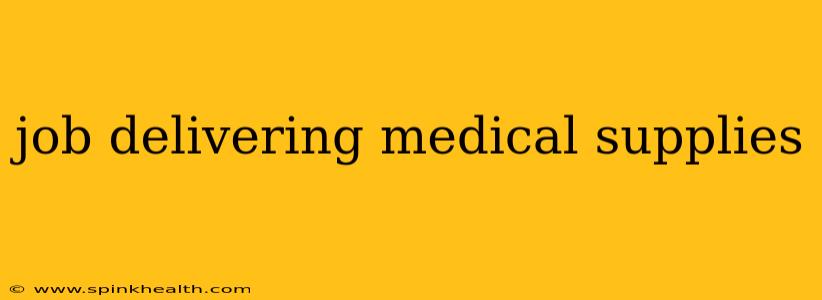The hum of the van engine was my morning alarm. Sunrise painted the sky in hues of orange and pink as I checked my manifest – another day, another whirlwind of medical supply deliveries across the sprawling city. This wasn't your average courier job; this was about more than just packages. It was about lives.
I'd started this job six months ago, leaving behind the sterile confines of a corporate office. The allure of making a tangible difference, of knowing my actions directly impacted people's health, was too strong to resist. Each delivery, from a single box of bandages to a pallet of vital medications, felt like a small victory in the ongoing battle against illness.
What Kind of Medical Supplies Do You Deliver?
My typical day is a kaleidoscope of deliveries. One moment I’m navigating rush-hour traffic to get life-saving medications to a bustling city hospital, the next I’m carefully unloading delicate lab equipment at a research facility. Sometimes I'm delivering supplies to smaller clinics in underserved communities, a task that feels particularly rewarding. I've learned to differentiate between the urgent and the routine deliveries, adapting my schedule to prioritize those that demand immediate attention. It's not just about what I carry; it’s about understanding the context of each delivery. A simple box of syringes could be the difference between a successful surgery and a postponement.
What Are the Challenges of Delivering Medical Supplies?
This job isn't without its challenges. Time is always of the essence. Missed deadlines can have serious consequences, and traffic jams can feel like battles I'm constantly fighting. Then there's the sheer variety of supplies. I've had to learn about temperature-sensitive medications, the proper handling of hazardous materials, and even the intricacies of delicate medical instruments. One wrong move could compromise the integrity of the supplies or, even worse, put someone at risk. It’s a constant learning process that requires attention to detail and a calm head under pressure.
What Qualifications Do You Need for This Job?
While a clean driving record is essential, it's the soft skills that truly matter. Patience, responsibility, and empathy are paramount. You're not just delivering boxes; you're handling crucial supplies that impact human lives. A strong understanding of safety regulations, including those relating to hazardous materials, is also a must. This is a job that demands meticulousness, as a single error can have significant consequences. Many employers also prefer candidates with experience in logistics or customer service, showcasing a proven ability to manage time effectively and interact professionally with clients and colleagues.
Is This a Physically Demanding Job?
Absolutely. This job is physically demanding. I spend hours on my feet, lifting and carrying heavy boxes. The work is often fast-paced and requires stamina. It's not just about strength; it's also about endurance and proper lifting techniques to prevent injury. It’s a job that requires both physical and mental resilience.
What Are the Rewards of This Job?
Despite the challenges, the rewards far outweigh the difficulties. The feeling of making a real contribution to healthcare is incredibly fulfilling. Knowing that my deliveries are directly contributing to the well-being of others gives my work a purpose that transcends simple logistics. The job is dynamic, constantly offering new challenges and learning opportunities. Plus, the people I interact with – hospital staff, clinic workers, researchers – are passionate and dedicated professionals, making the work environment inspiring and encouraging.
My journey as a medical supply runner has been far more rewarding and unexpectedly adventurous than I could have ever imagined. It’s a job that requires skill, dedication, and a strong sense of responsibility, but it's a job I wouldn't trade for anything. It's a career where every delivery is a step towards making the world a healthier place.

